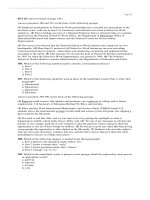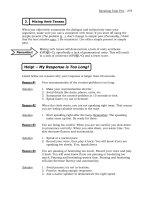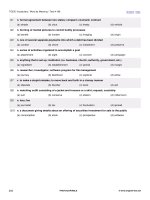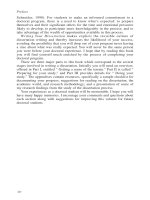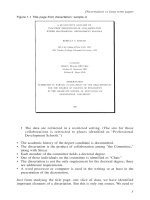Writing your doctoral dissertation - part 30 pptx
Bạn đang xem bản rút gọn của tài liệu. Xem và tải ngay bản đầy đủ của tài liệu tại đây (77.95 KB, 5 trang )
Appendix A
145
fifteen people participated in the informal three-hour roundtable discussions
and the ten one-hour interviews. While responses were received from across
the nation, the researcher acknowledges that the volunteers who took the time
to respond to the questionnaire or participate in the discussions may not have
been representative of the total pool of doctoral participants. But the number
of individuals who made the time to respond to these issues does suggest a
need to consider their responses carefully. This is particularly true since there
were so many common threads among the responses of people who attended
different doctoral programs.
Findings
What started out as a seemingly simple question has become increasingly
complex. There seem to be two major reasons people enter into a doctoral
program: intrinsic reward and extrinsic reward. Those who are seeking some
intrinsic reward are enrolling for their own, personal fulfillment and
enrichment. Those who are seeking an extrinsic reward, are fulfilling an
externally imposed requirement, often from professional institutions. Using
these two categories, we can create three different groups of students. These
three groups are represented in Figure A. 1.
One group (Group A) identified exclusively intrinsic, personal reasons for
pursuing the degree:
• I wanted to do something for myself.
• I wanted to learn more.
Note
Group A=those seeking personal enrichment, those with intrinsic motivation
Group B=those with both intrinsic and extrinsic motivation (personal enrichment and external
pressures)
Group C=those with extrinsic motivation, responding to external pressures
Figure A.1 Student expectations on entering doctoral programs
Appendix A
146
A second group (Group B) identified a combination of intrinsic (personal
reasons) and extrinsic (external mandates) rewards:
• I wanted to get a PhD; I wanted to teach at a college.
• I wanted to change my career. I wanted to see if I could get a PhD; I
wanted to learn more. My husband encouraged me to go.
A third group (Group C) identified exclusively fulfilling an extrinsic reward,
accommodating others’ requirements:
• I needed the doctorate to keep my job which I really liked at X University.
• I realized that people with the degree were listened to; those without it
were not.
Same Phenomenon—Different Perspectives
Many of the participants viewed experiences as obstacles; others perceived
these same experiences as a way to grow in different ways: for example, to
become more independent, more knowledgeable, more confident. Different
motivations may have influenced their views of their experiences.
Some participants provided striking metaphors for the process: Many
referred to the process as one of “going through hoops.” One participant
presented this quite forcefully:
I think what you learn about jumping through hoops to finish is probably,
in the long run, more valuable than the academic lessons that you learn
as you went through the process. …I think the hoop piece stays with you
more. It’s a better reason to hire someone with a doctorate than what
they know.
One thought of the process as “going up a huge mountain,” while another
connected it to a “coming of age experience.” In a recent article by
Fahrenthold (1997), in the Harvard Crimson, Steven Ozment, a professor of
ancient and modern history at Harvard was quoted as saying, “I worked day
and night on that dissertation. It was the most horrible experience I think I’ve
ever had” (p. 3).
The perceptions were all personal, focusing on a few significant themes.
The positive experiences included the following:
Feeling creative, smart, and self-confident
• exhilaration while gathering data and analyzing it;
• pride at recognizing writing and other proficiencies (“I have good
organization and integration skills”);
Appendix A
147
• pride from presenting at conferences and publishing in professional
journals (“I can do anything!”; “I figured it was all right for me to speak
up and say what I wanted to say”);
• confidence that they were respected as more knowledgeable in their
professional posts as evidenced by appointments to tenure track
university-based faculty lines and/or school district administrator
responsibilities.
Expanding group of friends
• support groups reduced the alienation and isolation which surfaced at
specific, crucial stages in the process;
• enjoyment of having a group of friends whom they saw at professional
conferences.
Understanding one’s learning process, including persevering despite
adversity
• pleasure at identifying and achieving a goal—an intellectual goal and
pursuit;
• a desire to continue learning—even enrolling in additional graduate
programs;
• “it was a wonderful intellectual journey…very intellectually challenging;”
• “I figured out that all this has to do with people and how people get
along —and how you need to deal with people to make this thing go
along—and how you can derail yourself from succeeding for reasons that
have zero to do with the academic piece. I had a career in politics
afterwards”;
• being resolute in completing the challenge of getting the degree, “I’ve
come this far, I’m not leaving empty-handed.”
The negative experiences included:
Feeling resentment and fear
• “I didn’t expect it to take up my life the way it did!”; “I can only give up
this amount of time and spend it on myself and my dissertation and
whatever, because I have this family that needs me”;
• “I never needed anyone’s help to do something like this before. I kind of
resent that”;
• dissertation seminar was a frequent setting for feeling resentment.
Common comments were: “It was the worst!” “We needed to support
each other—or else there was nothing.” “It was a waste of time!” “I
Appendix A
148
feared going there each week—but feared more what would happen if I
didn’t go!”
• some commented on how their mentor “protected” them—helping them to
avoid attending dissertation seminar;
Feeling totally isolated and unprepared for writing the dissertation
• feeling dependent at a time when independence was assumed—remarking
particularly at having so little information about what to expect in the
process, how to conduct the research, and how to write it up—how to get
it all together;
• unprepared for the need to obtain permission and approval for activities in
the dissertation, one student remarked, “I thought it was my project;”
• not realizing how much input and collaboration was required with the
faculty committee. In desperation, asking, “What do you [my major
professor] want me to do?”;
• “I had a very romantic idea—I thought I’d be flying to England and going
into a library with dark panelling—and I thought I’d be discovering some
brand new thing about language and thinking. …It’s the incremental steps
that I was not prepared for when I was imagining what the dissertation
process would be like. I saw it in a gestalt—kind of a whole—an
enlightenment, and I didn’t realize the intricate, detailed work that has to
go into it— the revision and rethinking in my case”;
• having conflicting feelings “being told that you are becoming the expert
in a field—and not feeling comfortable with that—and yet they [your
committee] still challenges you even though you are supposed to be the
new authority”;
• “needing to rely on others—yet not having comfortable access to this
community”;
• “anyone who has not gone through this process could not possibly
understand what we’re going through—no one in my family could believe
what I’m doing!”;
• distress at recognizing the need for external pressure to keep working;
• dismay at negative responses to drafts of the dissertation proposal;
• “I was always told what to do—you were always out to please Prof. X.”
Feeling shell-shocked when done
• experiencing so many extreme emotions in very brief timespans;
• needing time to put everything into perspective;
• not being ready to talk about it;
• trying to figure out what really happened.
Appendix A
149
Synthesis
When there are conflicts between the expectations and the experiences of the
participants, there is a need both to acknowledge and remedy the situation.
The one constant theme, whether perceived as a positive or negative
experience, was the lack of knowledge. Some saw this lack of knowledge as
an asset, suggesting that if they had known what was involved in the process,
they would probably never have started. But they quickly added that they
believed they would have regretted that. There was a clear desire to know as
much as possible about the process so that they could predict what was going
to happen, allocate time and money wisely, and understand their roles in that
process. One individual noted that the lack of any information about the
length of time the program would take and when to expect to be done became
unsettling for her/him, fearful that “the money would run out before finally
completing the dissertation.” Explicit information, respondents believed,
would make it easier to manage their responsibilities within and beyond their
doctoral program, as well as enabling them to feel more knowledgeable about
their progress. Without this information, they felt very vulnerable, as they
were totally dependent on others, particularly their committee.
Many students believe the dissertation is an extended examination in which
they must independently display their acquired knowledge. When they
encounter a dissertation director who expects them to consider the
dissertation as a transformative learning experience, with an apprenticeship
of sorts, they are astounded—unprepared for such an experience.
Many of the individuals compare their experiences to others’. Most believe
“I didn’t have as many upsets as I’ve heard other people have.” Many can
relate at least one “horror story,” which at the time they were involved in the
process was perceived as traumatic. These events ranged from the death of a
mentor to the disappearance of the only copy of a chapter. For some this was
the reason for dropping out, but most who had experienced such an event
had completed the process and saw the “upset” as a challenge to surmount.
Emergent Hypotheses
Several hypotheses are displayed in Table A.1. There were three different
motivations which brought people to doctoral programs. I have classified these as:
extrinsic (professional requirement), intrinsic (personal enrichment), or a
combination of professional extrinsic and intrinsic rewards. Typically, those who
were accommodating professional requirements (the extrinsic reward group) held
a view that the process of completing a dissertation involved a considerable amount
of hazing, jumping through hoops, and documenting their current knowledge. In
contrast, those who were pursuing a doctoral degree for intrinsic purposes expected
to have a transformative experience, to learn and grow personally in the process.
The third group believed that there would be both elements in the process (some
hoop jumping, along with a personal transformation).

